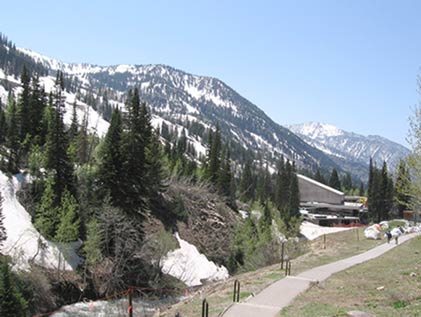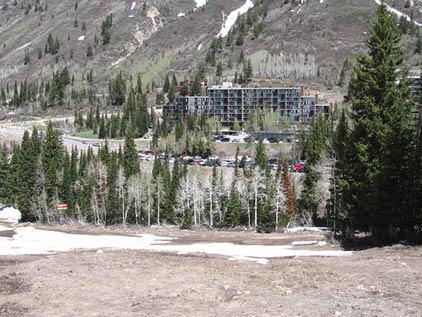Mathematics Research Communities - 2011
The
American Mathematical Society (AMS) invites mathematicians just beginning their research careers—those who are close to finishing their doctorates or have recently finished— to become part of
Mathematics Research Communities, a new program to build social and collaborative networks to inspire and sustain each other in their work. Women and underrepresented minorities are especially encouraged to participate. The structured program engages and guides all participants as they start their careers. The program will include:
-
One-week summer conference for each topic (participants arrive on Sunday and depart the following Saturday; sessions are held Monday through Friday)
-
Special Sessions at the national meeting
-
Discussion networks by research topic
-
Longitudinal study of early career mathematicians
Those accepted into this program will receive support (full room and board at Snowbird and up to US$612 in air transportation) for the summer conference, and will be partially supported for their participation in the Joint Mathematics Meetings which follow in January 2012. The summer conferences of the MRC are held in the breathtaking mountain setting of the Snowbird Resort, Utah, where participants can enjoy the natural beauty and a collegial atmosphere. This program is supported by a grant from the National Science Foundation.
June 12 – 18, 2011 - The Geometry of Real Projective Structures
Organizers:
Virginie Charette, Université de Sherbrooke
Daryl Cooper, University of California, Santa Barbara
William Goldman, University of Maryland
Anna Wienhard, Princeton University
A real-projective structure on a manifold is defined by a system of local coordinates modeled on projective space. Such structures abound in dimensions 2 and 3, and include many familiar geometries, such as spherical geometry, Euclidean geometry, and hyperbolic geometry. The space of such geometries on a fixed topology carries many interesting geometries of its own. This vastly extends the Fricke-Teichmueller space of geometric structures modeled on hyperbolic geometry.
The study of such structures intimately relates to many other fields of mathematics: Lie groups and their discrete subgroups, dynamical systems, geometric PDEs, low-dimensional topology, algebraic geometry, number theory and mathematical physics. The concrete nature of the subject invites computer experimentation. Through the experimental component of the MRC activity, participants will develop and use software to visualize and calculate these geometric structures.
June 19 – 25, 2011 - Computational and Applied Topology
Organizers:
Gunnar Carlsson, Stanford University
Robert Ghrist, University of Pennsylvania
Benjamin Mann, Ayasdi, Inc.
One of the exciting recent developments in applied mathematics has been the explosion of insights, techniques, and tools from algebraic topology that have been used to great advantage in examining computation problems in data analysis, distributed networks, and dynamical systems. This workshop will introduce participants to the theory, applications, and main advances in this emerging field, which unites theory and applications in Topology with some of Poincare's original motivation.
June 26 – July 2, 2011 - The Pretentious View of Analytic Number Theory
Organizers:
Andrew Granville, Université de Montréal
Dimitris Koukoulopoulos, Université de Montréal
Youness Lamzouri, University of Illinois at Urbana-Champaign
Kannan Soundararajan, Stanford University
Frank Thorne, Stanford University
Since Riemann's 1859 monograph, the study of the distribution of prime numbers has been dominated by the study of the zeros of the Riemann zeta function and Dirichlet L-functions. Although there have been ad hoc elementary proofs of some of the key results, there has been no coherent alternative approach to that of Riemann. This research community will study a new and different way to develop analytic number theory, without zeros, stemming from the concept of "pretentiousness".
Application Procedure
Individuals within one to two years prior to the receipt of their PhDs, or within one to three years after receipt of their PhDs are welcome to apply. The MRC program is open to individuals who are U.S. citizens as well as to those who are affiliated with U.S. institutions. A few international participants may be accepted. Women and underrepresented minorities are especially encouraged to apply. All participants are expected to be active in the full MRC program. Please note that there is a generic cover sheet to submit. However, submitting this cover sheet does not constitute an application. You must answer an additional set of questions and submit this as well. In addition to the completed application form (cover sheet and additional questions), you must submit a letter of reference from a mathematician who can discuss how you will benefit and how you will contribute by participating in the MRC program. Instructions are as follows:
-
Login to MathPrograms.Org as a Program applicant (click on “as Program applicant”).
-
To create an account, fill in your email address, create a password, click the button “this is my first login, please create an account for me”, then click the “login” button. A login token will be sent to the email address provided. Please check your email.
-
Once you have received the token, enter it in the text box on the screen, or come back to www.mathprograms.org within 24 hours and click on the applicant login link to continue.
-
Once you are logged in, fill in the cover sheet and submit it.
-
Click on “View Programs” and then click on “apply” next to the program you want.
-
Follow the directions from there.
-
If you have questions using this program, please contact Robin Hagan Aguiar at rha@ams.org
These forms will be available on November 15, 2010. Deadline for applications will be March 8, 2011.
Top of Page
Snowbird
 |
 |
Situated in a beautiful, breathtaking mountain setting, Snowbird Resort provides an extraordinary environment for the MRC. The atmosphere is comparable to the collegial gatherings at Oberwolfach and other conferences that combine peaceful natural ambience with stimulating meetings. MRC participants have access to a range of activities such as a tram ride to the top of the mountain, guided hikes, swimming, mountain bike tours, rock climbing, plus heated outdoor pools. More than a dozen walking and hiking trails head deep in the surrounding mountains. Participants also enjoy the simpler pleasures of convening on the patios at the resort to read, work, and socialize. In the evenings colleagues enjoy informal gatherings to network and continue discussion of the day's sessions over refreshments. Within a half hour of the University of Utah, Snowbird is easily accessible from the Salt Lake City International Airport. For more information about Snowbird Resort, see www.snowbird.com. Information
For further information, please contact
Ellen J. Maycock at
ejm@ams.org.
Top of Page




